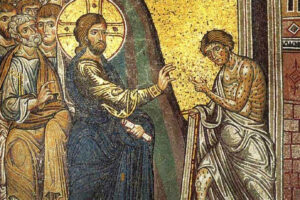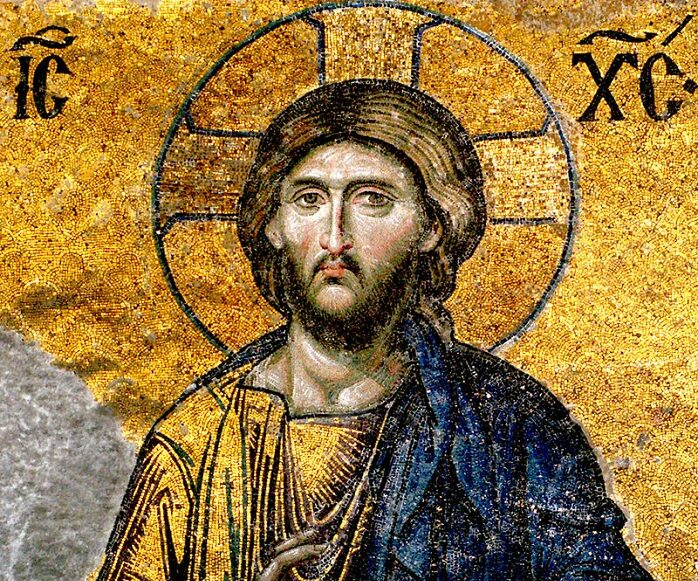The Bible’s Answer
Yes, the Bible teaches that the Lord Jesus Christ is still a human even to this day, and that he will be for all eternity. A couple of decades after the Lord Jesus Christ died, was resurrected, and ascended into Heaven, St Paul still referred to Jesus as a human, when he said:
5 For there is one God, and there is one mediator between God and men, the man Christ Jesus, 6 who gave himself as a ransom for all, which is the testimony given at the proper time. (1 Timothy 2:5–6, ESVUK)
The word for man/men in this passage is literally “human/humans” in the original Greek of the text. Paul is saying that Jesus is “the human” who intercedes for all “humans”. Furthermore, note that Paul uses the present tense for the verb “intercede”, meaning that “the man” Jesus is currently interceding right now. Altogether, according to Paul, it is not a “spirit” who is interceding for us, nor an “angel”, but it is “the man Christ Jesus” who is currently, and will always be, interceding for the human race. It’s as the book of Hebrews says: Jesus’ priesthood for humans will continue forever (Heb 7:23–25), and:
Jesus Christ is the same yesterday and today and for ever. (Hebrews 13:8)
Jesus’ humanity and priesthood will never end. Furthermore, Jesus himself prophesied early on in his ministry that after he dies, he would raise up his own body again, according to St John:
18 So the Jews said to him, “What sign do you show us for doing these things?” 19 Jesus answered them, “Destroy this temple, and in three days I will raise it up.” 20 The Jews then said, “It has taken forty-six years to build this temple, and will you raise it up in three days?” 21 But he was speaking about the temple of his body. (John 2:18–21, ESVUK)
According to this text, the body that died and was buried in the tomb was raised up again, by none other than Jesus himself. In his resurrection appearances, Jesus had the same human body that he had died in, only now it was also glorified, which was why St Mary Magdalene at first didn’t recognise him (Jn 20:15–16). In fact, Jesus strongly stressed that his human body was the same body that he died in, by showing his disciples the wounds in his hands, feet, and side from his crucifixion, and even inviting his disciples to touch the wounds, so that they knew they were physical wounds:
24 Now Thomas, one of the Twelve, called the Twin, was not with them when Jesus came. 25 So the other disciples told him, “We have seen the Lord.” But he said to them, “Unless I see in his hands the mark of the nails, and place my finger into the mark of the nails, and place my hand into his side, I will never believe.”
26 Eight days later, his disciples were inside again, and Thomas was with them. Although the doors were locked, Jesus came and stood among them and said, “Peace be with you.” 27 Then he said to Thomas, “Put your finger here, and see my hands; and put out your hand, and place it in my side. Do not disbelieve, but believe.” 28 Thomas answered him, “My Lord and my God!” (John 20:24–28)
Some might argue, “But couldn’t Jesus have had a spirit body, that only looked like a human body?” The problem with this is that Jesus denies this pretty much word-for-word:
See my hands and my feet, that it is I myself. Touch me, and see. For a spirit does not have flesh and bones as you see that I have.” (Luke 24:39)
The word for “spirit” here is the same word used in reference to the Holy Spirit, and can also refer to ghostly apparitions or good/evil spirits (i.e. angels and demons), depending on the context. The point of Jesus’ words is that non-bodily or non-physical entities do not have flesh and bones, which Jesus does have. Therefore, holding to the myth that Jesus is only a spirit is not an option for true Christians. True Christians will gladly affirm the Bible’s teaching that Jesus is still a human.
It’s also worth noting that in Paul’s epistle to the Colossians, he says about Jesus: “For in him the whole fullness of deity dwells bodily” (Colossians 2:9). For Paul (and all the other New Testament authors), there is no contradiction to the fact that “deity dwells bodily” in Jesus. Jesus’ humanity does not (and never did) cancel out his Godhood or deity. St John affirms that “the Word” (Jesus) “was God” (Jn 1:1) and that “the Word became flesh and dwelt among us” (Jn 1:14). Jesus is, and will always be, the God-man.
I Believe in the Resurrection of the Body
In the Third Article of the Apostles’ Creed, Protestant and Roman Catholic Christians around the world confess every Sunday “I believe in … the resurrection of the body, and the life everlasting” (Eastern Orthodox Christians also confess this in the Nicene Creed). The good news is that just as Jesus was raised from the dead in the same body in which he died, Christians will also receive their bodies back in the resurrection, just like him. In fact, there will be a bodily resurrection of everyone in the world—both of the wicked and the righteous (Acts 24:14–15), but only those who trust in Jesus will go to the resurrection of life, rather than judgement (John 5:24, 28–29). Just as Jesus’ body was transformed, so too will the bodies of Christian believers:
20 But our citizenship is in heaven, and from it we await a Saviour, the Lord Jesus Christ, 21 who will transform our lowly body to be like his glorious body, by the power that enables him even to subject all things to himself. (Philippians 2:20–21)
In fact, Jesus’ bodily resurrection is a guarantee of our own bodily resurrections. Paul says that Christians will participate in a resurrection just like Jesus’ resurrection in his first letter to the Corinthians, when he says, referring to Christians who have died as “those who have fallen asleep”:
But in fact Christ has been raised from the dead, the firstfruits of those who have fallen asleep. (1 Corinthians 15:20)
In calling Jesus the firstfruits of Christians who will be resurrected, Paul is saying that just as Jesus received back his body, which was then transformed to perfection, we too will receive back our same human bodies, and have them transformed to perfection. We are guaranteed this in the Sacrament of Holy Baptism, in which the Holy Spirit unites us to Christ’s death and resurrection (Romans 6:3–5).
What Does This Mean for Us?
So, what does it mean for us that God the Son—Jesus Christ—became a human, died and rose again as a human, and will be a human forever?
First, it is God’s loving way of demonstrating that he will always be for humans, not against us. There is probably no greater honour to humanity than that the immortal God, who created us, loved humanity so much that he actually became one of us, and even died as one of us, in order save us—even though we are sinners (Jn 1:1–14; Rm 3:23; Heb 2:14–18)!
Second, it tells us that God, who created human beings in his image (Gen 1:26–27), has said that the body is good! The body is not a hindrance to spirituality, but rather a fundamental and inseparable aspect of who we are, and a blessing of God (1Thes 5:23–24).
Third, it tells us that God highly values our bodies. Some of us might think that our bodies are ugly, or disproportionate, but God loves you just the way you are—and always will (Ps 139:13–14). God wants you to care for your body, and he wants you to believe in Jesus, so that he can make your body his holy temple in which he lives (1Cor 3:16–17). In fact, God loves your body so much that—through faith in Jesus—he will not let it waste away forever, but will one day bring it back to life and to everlasting perfection—as it was intended to be.
Jesus Christ is, and will always be, the God-man. The Eternal Son of God who lives forever to make intercession for us before God the Father in Heaven, with the Holy Spirit.
See Also






